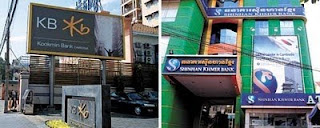 Blogger note: Cambodia's size is 181,035 squate kilometers NOT 181,000 squate kilometers
Blogger note: Cambodia's size is 181,035 squate kilometers NOT 181,000 squate kilometers Shinhan Khmer Bank, right, opened in October 2007, while Kookmin Bank Cambodia opened in May 2009. Both banks have been working hard to attract more Cambodian customers instead of members of the Korean expat community - the traditional clientele of Korean banks operating abroad. By Kim Joon-hyun
Shinhan Khmer Bank, right, opened in October 2007, while Kookmin Bank Cambodia opened in May 2009. Both banks have been working hard to attract more Cambodian customers instead of members of the Korean expat community - the traditional clientele of Korean banks operating abroad. By Kim Joon-hyunJanuary 19, 2010
JoonAng Daily (South Korea)
Until about 10 years ago, few Korean companies imagined that Cambodia - an impoverished Southeast Asian country ravaged by decades of internal conflicts - would become one of the top destinations for local banks looking to step onto the global stage.
But the situation has radically changed since then, and a growing number of Korean financial companies are starting to view the country as a promised land with vast growth potential.
With competition becoming increasingly cutthroat and even self-predatory in Cambodia, Korean firms are finding that localization is the key to survival and success in a market that some optimistic experts hail as the next Vietnam.
Kookmin Bank, Korea’s largest lender by assets, is one of most aggressive foreign firms in Cambodia and has been beefing up its localization efforts since it took a foothold in the country last year. The bank set up a locally incorporated unit, called Kookmin Bank Cambodia, last year and has been working hard to increase the bank’s brand awareness among locals.
At 5 p.m. on a recent Friday, some 20 Cambodian employees gathered at the branch office in downtown Phnom Penh to attend a seminar led by Kim Eung-nam, vice chief of the Cambodian unit. Kim holds the weekly seminars to train local employees about basic and advance-level banking operations.
“This is not a mandatory event, but everyone attends it every week regardless,” Kim said. “They are so eager to learn.”
The weekly seminar has an important long-term goal: help local employees learn enough about the company and the industry so that they can become senior managers one day.
“We have emphasized repeatedly that the bank, though formed by Koreans, is a Cambodian company,” said Jang Ki-sung, the head of Kookmin Bank Cambodia.
Jang said he plans to let one of the Cambodian employees head the bank’s second branch in the country, which Kookmin plans to open next year. He also promised a fat bonus for everyone if the bank produces profits this year, hoping it will serve as an incentive to work harder.
In another effort to nurture leadership among local employees, Kookmin in 2007 hired a handful of locals in several countries it wanted to enter in the future - including Cambodia - before it set up operations in those nations. The company brought the employees to the bank’s headquarters in Seoul to participate in training programs that lasted over a year.
Fast-forward three years, and two of those initial hires are working at Kookmin Bank Cambodia’s private banking division as managers.
Among the 1,226 banking accounts that have been opened via the Cambodian unit through last November, 663 of them - or about 55 percent - belong to locals as opposed to Korean expats and businessmen operating in the country.
About 70 percent of the bank’s total loans also were made to Cambodians, a rarity for a foreign unit of a Korean bank that has long catered to expats.
“It is premature to judge whether or not we have been successful here since this bank was officially established in May of last year,” Jang said. “But at least we have a good start.”
Other Korean banks are tapping the market as well. Shinhan Bank, for instance, was one of the pioneers in Cambodia, setting up a unit in the country called Shinhan Khmer Bank in October 2007. Lee Jae-joon, the head of Shinhan Khmer, boasts that 80 percent of the unit’s loan borrowers are local Cambodians.
That’s not to say everything is rosy for these companies: The industry is still relatively new, corruption in the country is rampant and there’s a severe lack of relevant funding options. Also, most of deposits are of the short-term nature, posing a big challenge for banks when it comes to managing their deposit pool.
“Corporate balance sheets are considered very unreliable, meaning we can’t lend on a non-collateral basis,” said Lee of Shinhan Khmer.
Jang echoed that sentiment, saying such lingering uncertainties are the reason why global banking giants like HSBC and Citibank have yet established a presence in Cambodia.
